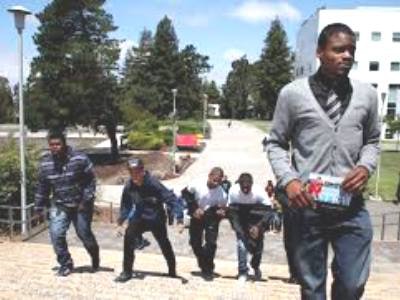 Expert says that, on campuses large and small, in the academy and in the broader society as a whole, it is critical that safe spaces exist for Black men, the most marginalized group of both the academy and society at large.
Expert says that, on campuses large and small, in the academy and in the broader society as a whole, it is critical that safe spaces exist for Black men, the most marginalized group of both the academy and society at large.KINGSTON, Jamaica ― Black men need safe spaces to be able to express themselves, enrich themselves, be themselves.
On campuses large and small, historically Black or predominantly White, in the academy and in the broader society as a whole, it is critical that these spaces exist for this most marginalized group of both the academy and society at large.
That was the message reinforced Friday by Dr. Bridget McCurtis, assistant vice provost of diversity initiatives at New York University, in the closing keynote of the International Colloquium of Black Males.
McCurtis asked the audience of students, administrators and faculty members to discuss their limitations and frustrations on their respective campus environments. Many of the responses seemed to reflect shared sentiments that transcended specific locales.
“I can’t leave my fam behind,” said one Ohio State University student who said he is struggling with the idea of leaving his friends in his home neighborhood and the perception by those friends that he is no longer one of them. The student’s sentiments mirrored what was described by many throughout the week as an identity crisis, a struggle to find a place of belonging that many — both in the U.S., Jamaica and across the world — are facing as they go on to pursue their educations.
“I can’t subscribe to this notion of masculinity that many of our young boys subscribe to,” said a professor from the University of the West Indies at Mona, Jamaica, which served as a partner institution to the colloquium. “But I can be a role model for those” who need one, he added.
How does one reconcile a desire to move forward and advance his own life without projecting the perception that he is leaving behind those he cares about or becoming “brand new?”
The answer, someone suggested, is in “being aware of who I am while being aware of people who are not like me,” “tell[ing] your story and listening to others.’”
But not all of the challenges had such direct solutions.
“I can’t represent my entire culture” on a campus in which few look like me was one such reflection.
“I can’t control environmental factors once they go home” was another, shared by a program administrator who recently counseled a student who had to drop out after his first semester to get a job and support his family back home. The same could apply to the first student who shared that he can’t leave his “fam” behind. “I can’t protect students from the realities of this world,” was another concern voiced by a professor at the University of Louisville that fit in the same vein.
For some students, the breaks between semesters put them back into environments where violence and drama abound, and some find themselves around people and in situations that could be detrimental to their degree pursuits. How can campus mentors and administrators help students to bridge those gaps between semesters to make sure they stay on track and return to campus the next semester?
“I can understand my privilege as a faculty member — I don’t have to wait until a student is in my class to help them,” said the Louisville professor.
“I can start ‘taking some [losses],” said the Ohio State student, who added that in his own life, the most instrumental factor in helping him to see his own potential was “when people sacrificed to the extent of ‘why are you doing this for me?’”
“There are things that we can [all] do to show other people what it’s like to win,” he continued. “The willingness to take losses that you can sustain for someone else’s win” shows people they are worth investing in, and in turn motivates their investment in themselves.
In the same vein, “being available, seeking out people, being consistent about keeping in touch” can also go a long way in helping to bridge the gaps between semesters, once faculty member offered.
The candor of the participants’ responses served as a stark reminder that many do not have places on their campuses to freely express themselves and recharge with others like themselves, which must change if universities are to recruit and retain male students, faculty and administrators of color.


















